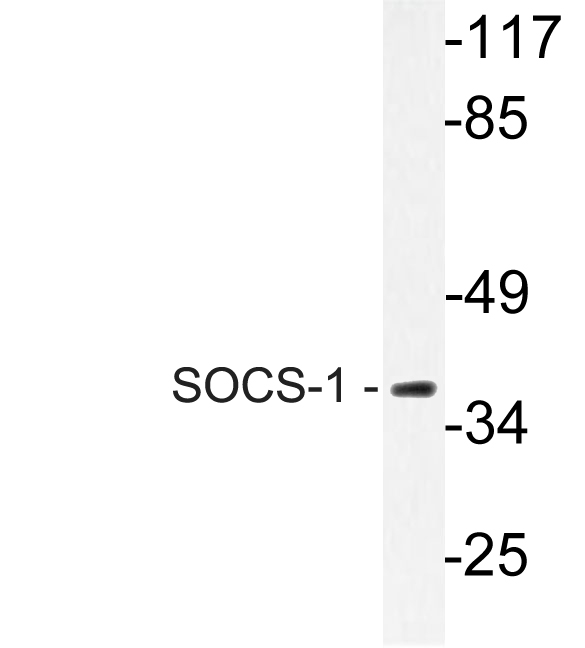
| WB | 咨询技术 | Human,Mouse,Rat |
| IF | 咨询技术 | Human,Mouse,Rat |
| IHC | 1/50-1/100 | Human,Mouse,Rat |
| ICC | 1/50-1/200 | Human,Mouse,Rat |
| FCM | 咨询技术 | Human,Mouse,Rat |
| Elisa | 1/10000 | Human,Mouse,Rat |
| Aliases | SOCS1; SSI1; TIP3; Suppressor of cytokine signaling 1; SOCS-1; JAK-binding protein; JAB; STAT-induced STAT inhibitor 1; SSI-1; Tec-interacting protein 3; TIP-3 |
| Entrez GeneID | 8651 |
| WB Predicted band size | Calculated MW: 24 kDa; Observed MW: 38 kDa |
| Host/Isotype | Rabbit IgG |
| Antibody Type | Primary antibody |
| Storage | Store at 4°C short term. Aliquot and store at -20°C long term. Avoid freeze/thaw cycles. |
| Species Reactivity | Human,Mouse,Rat |
| Immunogen | The antiserum was produced against synthesized peptide derived from human SOCS-1. AA range:49-98 |
| Formulation | Purified antibody in PBS with 0.05% sodium azide,0.5%BSA and 50% glycerol. |
+ +
以下是关于SOCS1抗体的3篇代表性文献摘要(虚拟示例,仅供参考):
1. **"SOCS1 negatively regulates cytokine signaling by targeting JAK2 for degradation"**
*作者:Starr R, et al. (1998)*
摘要:该研究首次揭示了SOCS1蛋白通过其抗体可检测的SH2结构域结合JAK激酶,促进其泛素化降解,从而抑制IL-6等细胞因子的信号传导。文中使用特异性SOCS1抗体验证了其在免疫细胞中的表达调控。
2. **"SOCS1 deficiency enhances antitumor immunity by expanding dendritic cell activation"**
*作者:Cheng Y, et al. (2018)*
摘要:通过SOCS1抗体免疫组化分析发现,SOCS1敲除小鼠的树突状细胞活化增强,导致T细胞抗肿瘤反应显著提升,揭示了SOCS1在肿瘤免疫微环境中的负调控作用。
3. **"Epigenetic silencing of SOCS1 in hepatocellular carcinoma via antibody-detected promoter methylation"**
*作者:Wang L, et al. (2021)*
摘要:研究利用SOCS1特异性抗体结合甲基化测序技术,证明肝癌组织中SOCS1启动子高甲基化导致其蛋白表达缺失,进而促进STAT3信号通路的持续激活和肿瘤进展。
The suppressor of cytokine signaling 1 (SOCS1) antibody is a crucial tool for studying the SOCS1 protein, a member of the SOCS family that negatively regulates cytokine signaling pathways, particularly the JAK-STAT pathway. SOCS1 acts as a feedback inhibitor by binding to JAK kinases or cytokine receptors, suppressing excessive immune responses and maintaining cellular homeostasis. It plays vital roles in immune regulation, cell proliferation, apoptosis, and inflammation. Dysregulation of SOCS1 has been linked to autoimmune diseases, cancers, and chronic inflammatory conditions, making it a key focus in immunology and oncology research.
SOCS1 antibodies are widely used in techniques like Western blotting, immunohistochemistry (IHC), flow cytometry, and immunofluorescence to detect SOCS1 expression levels, cellular localization, and protein interactions. These antibodies help elucidate SOCS1's role in disease mechanisms, therapeutic responses, and signaling network modulation. Researchers often validate SOCS1 antibodies using knockout cell lines or siRNA-mediated SOCS1 knockdown to ensure specificity. Commercial SOCS1 antibodies are available in monoclonal and polyclonal forms, with selection depending on experimental needs. However, batch variability and cross-reactivity with other SOCS family members (e.g., SOCS3) remain challenges, necessitating careful optimization and controls in experimental designs.
×